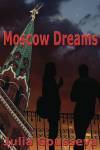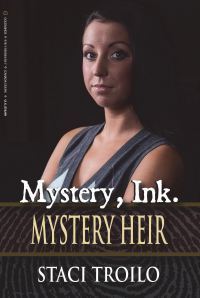P.C. Zick's Blog, page 38
January 27, 2014
Author’s Blog Chain
It’s my pleasure today to participate in the Author’s Blog Chain. Francis Guenette tagged me on her blog, 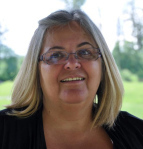 Disappearing in Plain Sight. I also reviewed her delightful novel, Disappearing in Plain Sight.
Disappearing in Plain Sight. I also reviewed her delightful novel, Disappearing in Plain Sight. 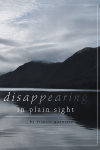 Please visit her blog. She writes thoughtful pieces on the process of becoming and sustaining a career as an Indie Author. I’ve found many of her insights very helpful in my journey as an Indie Author.
Please visit her blog. She writes thoughtful pieces on the process of becoming and sustaining a career as an Indie Author. I’ve found many of her insights very helpful in my journey as an Indie Author.
The Author’s Blog Chain requires me to answer four questions about my writing life, so here goes:

Sketch of P.C. Zick by Jae at Lit and Scribbles
1. What are you currently working on?
I’m working on my next Florida Fiction novel, Native Lands. This work looks at who owns the land on which we live and how we should tend to that land as good stewards. There’s plenty of love and intrigue and nasty antagonists. I hope to publish it sometime before the end of the year. I’m also working on a nonfiction book, Odyssey to Myself, which is a collection of essays on my travels from 2004-2009 and how each trip held a significant life lesson. I’m also developing an editing and book formatting business, which I hope to launch very soon.
2. How does your work differ from others’ in the same genre?
I think most authors like to think their work is different from any other work, and I’m no exception. I’ve been compared to Carl Hiassen because I write about the disastrous effects of development on Florida; I’ve been compared to Anne Rivers Siddons because of my southern characters. I may have elements of those writers’ genre in my work, but I also write in-depth about nature and wildlife. I take a page from the John Steinbeck book of writing and try to create metaphors in nature that represent man’s actions. I aspire to write as noteworthy books as those I’ve mentioned!
3. Why do you write what you write?
Good question. I often refer to Rachel Carson’s (Silent Spring) comment on how she chose her subjects. She said that she never chose a subject, but rather the subject chose her. I believe I’ve chosen my path to help bring awareness on issues regarding nature and all its creatures. If we continue to live thoughtless lives without consideration of the natural world around us, then we’re dooming our future generations to some heavy burdens.
4. How does your writing process work?
I’m not sure I have a process. I write when the mood strikes, which is every day. I keep several journals going. I usually have a work in progress. I tend to begin with an idea and then plot it out, researching as I go. With every project, the process changes.
Now that I’ve answered questions about my writing life, I’m tagging three other authors so they can continue the Author’s Blog Chain.
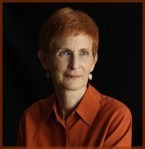 Christina Carson – I discovered Christina Carson’s work through my social media channels and what a lovely surprise to find her. I’ve read one of her books, Suffer the Little Children, and reviewed it, and Christina wrote a guest blog for Author Wednesday in June. Her books are delightful reminders that novels serve as more than entertainment; they also show a way to live a more thoughtful existence
Christina Carson – I discovered Christina Carson’s work through my social media channels and what a lovely surprise to find her. I’ve read one of her books, Suffer the Little Children, and reviewed it, and Christina wrote a guest blog for Author Wednesday in June. Her books are delightful reminders that novels serve as more than entertainment; they also show a way to live a more thoughtful existence
From Christina: I was born in Chester County, Pennsylvania, when it still looked like the verdant farming country of England. Horses and dairy farming were prominent, and I chose horses. Educated as a scientist, I was a child of the 1960s, and one of the outcomes of that was my stance as war protester. Leaving a Ph.D. program and the United States in 1968, I settled in western Canada and fell in love with the wildness of the country and the tolerance of the people. The cold was a tad stunning, however. I’ve been writing nonfiction and poetry as long as I can remember, but eight years ago, I began to write fiction. In 1996, I came back to the States on the arm of a Vietnam veteran. Now there’s a story for you. Presently, I reside in Alabama with my husband, also a writer. Neither the adventure of life and its wonder, nor what it has yet to teach me seem anywhere close to an end.
Links :
Blog: Cristina Carson, Writer
 Darlene Jones – Darlene Jones caught my attention when I came across her blog, Em and Yves. Her experiences from living in Mali made an indelible mark on her so much so she’s dedicated herself to writing books that reflect a country and culture living in poverty and pain. I usually don’t read science fiction, but Darlene’s purpose in writing her novels intrigued me. I was pleasantly surprised how much I enjoyed reading, Embattled, which I reviewed on Book Review Friday. Darlene has also appeared on Author Wednesday.
Darlene Jones – Darlene Jones caught my attention when I came across her blog, Em and Yves. Her experiences from living in Mali made an indelible mark on her so much so she’s dedicated herself to writing books that reflect a country and culture living in poverty and pain. I usually don’t read science fiction, but Darlene’s purpose in writing her novels intrigued me. I was pleasantly surprised how much I enjoyed reading, Embattled, which I reviewed on Book Review Friday. Darlene has also appeared on Author Wednesday.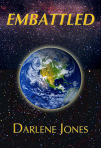
From Darlene – A long time ago, I lived in Mali. Every single day, I wished I could wave a magic wand to relieve the heart-wrenching poverty. The story line of my books reflects my desire to wave that wand and make the world a better place. If only wishes could come true. And of course, every novel needs its love story, so along with the sci-fi magic, I’ve added the requisite romance.
I’ve always believed we can’t be the only beings existing in the vastness of the universe. There must be others “out there somewhere,” and I brought some of them along for the ride. The setting stays, for the most part, within the realities of our world, but I’ve found that I love the magic the sci-fi element of other beings can bring to the story.
Links:
Blog: http://emandyves.wordpress.com
Books: http://www.amazon.com/Darlene-Jones/e/B005ZVH88G
 Paffi S. Flood – One of my blogger friends, Staci Troilo introduced me to Paffi S. Flood. I’m very pleased to meet her and add her to the growing list of author friends I’ve met since starting Writing Whims. Her novel A Killing Strikes Home is another in the series of Mystery, Ink by Goldminds Publishing.
Paffi S. Flood – One of my blogger friends, Staci Troilo introduced me to Paffi S. Flood. I’m very pleased to meet her and add her to the growing list of author friends I’ve met since starting Writing Whims. Her novel A Killing Strikes Home is another in the series of Mystery, Ink by Goldminds Publishing.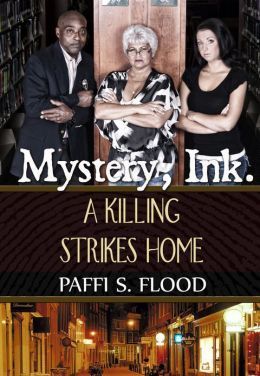
From Paffi – Ever since I worked on the school newspaper in the seventh grade, I had a passion for writing. Although I pursued software engineering in college, being a writer was always in the back of my mind. A decade ago, I attended writing classes and workshops and was encouraged to chase my dream. A Killing Strikes Home published by Goldminds Publishing, LLC: in January 2013 is my debut novel, and I’m currently working on my next one.
Links:
Website: www.paffisflood.com
Twitter: @paffiFlood
A Killing Strikes Home on Amazon
Please visit these other authors and their outstanding work. They’ll be posting their Author’s Blog Chain on February 3.


January 24, 2014
Keep Moving with a Thick Skin
 Reblogged from Living Lightly:
Reblogged from Living Lightly:



Many of you know that in addition to writing this blog about all topics pertaining to living consciously and lightly upon the planet, I also write fiction. In fact, writing novels consumes me most of the time these days. In the past two years, I've published two novels and re-issued two traditionally published novels.
Like most writers, I'm sensitive but have been forced to develop a tougher exterior.
Book Review Friday – Shadow of Eden
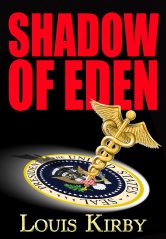 Shadow of Eden by Louis Kirby, M.D. is a thriller of a book, but it’s so much more than that.
Shadow of Eden by Louis Kirby, M.D. is a thriller of a book, but it’s so much more than that.
The different levels run the gambit from our society’s obsession with thinness at any cost to the sway of power and money with an even higher price tag.
I usually don’t read this type of action-packed, plot driven novel. However, after finishing Shadow of Eden in two days because I couldn’t leave it alone, I wonder why I’ve put limits on my reading list. As usually happens, when I step out of my reading pigeonhole, surprising things happen.
At first, the number of characters and the changing names with each new chapter caused some confusion. However, as the layers of the story began to coalesce, I forgot about trying to keep all the names straight and went for the enjoyment of losing myself in the story. While the characters and their traits are important to the story, they aren’t as important as the speeding plot heading for a collision with the climax of the story.
I like the short chapters, too. This technique allows the plot to move forward quickly, and I didn’t have much of a chance to wonder if I knew who everyone was or if I was enjoying the genre or not. Who can stop to analyze when the novel’s train has already left the station and sped around the corner? That’s a good thing for me when I read. As a writer myself, I spend far too much time taking apart the guts of what I’m reading. When I stop doing that and allow myself to be transported into a story, then I know the author has done what all good writing should do. Good writing gives the reader the opportunity to forget they’re reading. Good writing transports the reader into the cockpit of a jet, even though the reader has never been inside of one. Good writing transcends believability because no matter what comes next, the reader has become lost in the setting and conflicts and plot. Dr. Kirby’s writing falls into this category.
Dr. Kirby delved into subject matter that required a tremendous amount of research. His standing as a respected neurologist and founder of a facility specializing in human drug testing gave him very specific knowledge of the body and its reaction to foreign substances; his knowledge of jets, government infrastructure, and corporation duplicity shines through in this novel for a fast read and a vast amount of tracks to explore.
I’m a fan of both Dr. Kirby and the action-packed thriller after reading Shadow of Eden.


January 22, 2014
Author Wednesday – Louis Kirby
 Welcome to Author Wednesday. Today it is a privilege to introduce Louis Kirby, MD, the author of Shadow of Eden, a medical-political thriller. Dr. Kirby describes the novel as “Crichton meets Baldacci.” The book is chilling in its authenticity of miracle weight loss drugs at any cost, corrupt politicians, and greedy moguls ready to make a buck at the cost of human lives. At the center is a lone doctor determined to learn the truth before more people die, including the President of the United States. It’s fiction, but its lure is in its haunting plausibility.
Welcome to Author Wednesday. Today it is a privilege to introduce Louis Kirby, MD, the author of Shadow of Eden, a medical-political thriller. Dr. Kirby describes the novel as “Crichton meets Baldacci.” The book is chilling in its authenticity of miracle weight loss drugs at any cost, corrupt politicians, and greedy moguls ready to make a buck at the cost of human lives. At the center is a lone doctor determined to learn the truth before more people die, including the President of the United States. It’s fiction, but its lure is in its haunting plausibility.
Welcome to Author Wednesday, Dr. Kirby. I’ve just finished reading Shadow of Eden so I’m curious about how you find your topics. Rachel Carson (Silent Spring) said she never chose a subject because as a writer, the subject chose her. Is that true of your writing?
My career as a neurologist and principal investigator on countless pharmaceutical studies gave me front line experience in the whole process of drug development: the good, the bad and the ugly. This process is not well understood by many, and I wanted to tell the story about a small drug company’s manipulation of the system. In addition, the specific side effect featured in the book is very real and deadly so I combined them both into a story that is highly disturbing in its implications. So, yes, the subject grabbed me like a rabid dog and wouldn’t let go.
I can understand why you had to write it. Who has most influenced your writing?
The most influential book was Syd Field’s Screenplay. Shadow of Eden was originally a screenplay (I’m ready, Hollywood) but Syd’s lessons on the structure of a story resulted in Shadow’s structural bones; yet the story feels organic and natural. The second thing Syd taught is to get into a scene late and exit early. No unnecessary chitchat, no wasted descriptions or fluff.
As I read the book, I kept envisioning it on the screen. What knowledge have you acquired recently that might assist other writers?
Once I published Shadow of Eden, I started directly contacting authors in my genre, both to learn from them and to offer my thoughts. I found them all to be very receptive. This is a gratifyingly open community. I have enjoyed making new author friends.
I agree. I’ve heard horror stories about competing authors in the same genre, but fortunately I haven’t run across any of them. It’s been a very gratifying experience for me as well to share and receive. That’s why I started Author Wednesday so I could probe others’ minds. So back to Shadow of Eden. Do you have a favorite character from the book?
To some extent all of them are my favorites even though not all are likable. They all have different personalities, agendas, skills, and roles. If I had to pick one, I’d say it was Valenti, the damaged goods private investigator that the main character recruits to help him. Valenti is funny, profane, sarcastic, and unpredictable, yet smart and capable. He was very fun to write, as he has no filter on what he says. He makes a good foil for our hero, and ultimately, they form a tight relationship.
That’s true. Valenti helped break up the tension when it almost became too much. Good job on his characterization. Are you planning to continue medical thrillers?
I love science, medicine, and exploring their frontiers, in particular how they shape our culture, religion, and philosophy. Think how “the pill” shaped our cultural psyche and led to the sexual revolution. In Shadow of Eden, Eden, the blockbuster weight loss drug, exploits the obsession America has with attainable physical perfection, and the extent to which we will go to achieve those ends. My next project also explores science and interface with the social fabric. I feature a scientific expedition to discover the Garden of Eden, specifically looking for the tree of life and the fountain of youth its discovery would unlock.
I look forward to reading it. I’m always asked how long it took for me to write my novels, and I’m never quite sure. So I’ll ask you , too. How long do you estimate it took you to take the book from an idea to a finished, published?
The whole process took about five years. I took two years to research the story, from talking my way into the cockpit of a 747 while in flight; speaking at length to a top gun pilot and the former deputy director of the CIA; to personally exploring the physical layout of the National Cathedral and Smithsonian institutions. The book writing took another two years and edit. The last year I spent closely re-(and re- and re-) reading with my editor and proofing the final manuscript.
I wondered how you were able to be so precise in that opening scene in cockpit. Who or what is the antagonist in your book? Did you enjoy creating this character?
I have two, really. The first is Viktor Morloch, the charismatic, patrician CEO of the Trident Pharmaceuticals. He’s smart, ruthless, calculating, and absolutely unflappable. Think Roy Scheider in pinstripes. The other is an ex-FBI assassin, Kirk Mallis who is cool, poised, relentless, and cunning. Yet they are written as real people. We get inside each of their heads, we see their successes and their frustrations, and I want the reader to care about what happens to them. Great villains make great heroes. Walter White of Breaking Bad is a complex and fascinating character that roped us in with his feelings and his conflicts, yet he does bad things. And we watched in droves.
So true. I believe both the antagonists and the protagonists must be balanced to be believable. I imagine you have a fairly full schedule, but when you do have down time what do you like to do?
I get physical. Twice a year I climb the Grand Canyon, top to bottom and back out in one day. Consequently, I have an incentive to stay in shape because once down, there’s nobody else who’s going to haul out your sorry carcass. My wife, daughter, and I also travel a lot, and I take my camera, which is my second hobby, and take pictures. I posted a sample of our trip to Lago di Como on my website.
That’s a major physical accomplishment. Sounds like you’ve found a way to enjoy your time away from work.
Thank you for your very interesting questions and an opportunity to participate in your blog. I wish you all the best success in your own writing.
Thank you. I hope you’ll come back to Author Wednesday when your new book comes out. And most of all, I look forward to reading another thriller from you.
 Bio: Louis Kirby, MD has specialized in research and treatment of neurodegenerative diseases, chiefly Alzheimer’s and Parkinson’s disease, during his professional career as a neurologist. Louis served as principal investigator on nearly 400 human clinical trials at Pivotal Research, a company he founded. He has given presentations at national and international conferences on drug development and consulted for the government and the pharmaceutical industry. Throughout his life he has always been drawn to writing. While in medical school he published several stories, one landing him in hot water with the Dean of Medicine.
Bio: Louis Kirby, MD has specialized in research and treatment of neurodegenerative diseases, chiefly Alzheimer’s and Parkinson’s disease, during his professional career as a neurologist. Louis served as principal investigator on nearly 400 human clinical trials at Pivotal Research, a company he founded. He has given presentations at national and international conferences on drug development and consulted for the government and the pharmaceutical industry. Throughout his life he has always been drawn to writing. While in medical school he published several stories, one landing him in hot water with the Dean of Medicine.
Contact Louis Kirby
Email Louis Kirby at: lk@louiskirby.com.
Amazon: http://www.amazon.com/Shadow-of-Eden-ebook/dp/B00EN86WRU
Website: LouisKirby.com
Twitter: @lou7is (the 7 is silent)
Shadow of Eden Purchase Links


January 21, 2014
Author P.C. Zick
 Reblogged from Elite Book Design:
Reblogged from Elite Book Design:
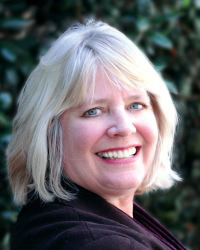
P.C. Zick’s career as a writer began in 1998 with the publication of her first column in a local paper. By day, she was a high school English teacher, but at night and on vacations, she began writing novels and working as a freelance journalist. By 2001, she left teaching and began pursuing a full-time gig as a writer. She describes herself as a "storyteller" no matter the genre.
Elite Book Design put together the video trailer for A Civil War Journal of a Union Soldier. Check them out - they do fantastic work!
Please Help a Fellow Author Who Has Suffered a Serious Stroke
 Reblogged from "CommuniCATE" Resources for Writers:
Reblogged from "CommuniCATE" Resources for Writers:
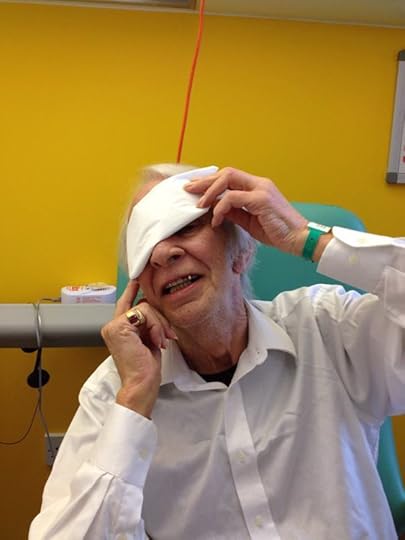





The greatest gift blogging and social networking has given me is the people I have met, some of whom are very dear to my heart. This post is an appeal to help Rags Daniels, a fellow Author who has suffered a stroke. He is in his early seventies and has a long road to recovery ahead. Obviously, he is offline, so I am asking all of you to help out by sharing / tweeting about Rags' books and/or buy some to help him with the medical costs his family are undoubtably inundated with.
If you're so inclined. . .
January 20, 2014
Blog Tour – The Redemption of Caralynne Hayman
I’m happy to have Carole Brown stop here for a guest post during the blog tour for her novel, The Redemption of Caralynne Hayman. Be sure to scroll down to the bottom of the post to enter the giveaway.
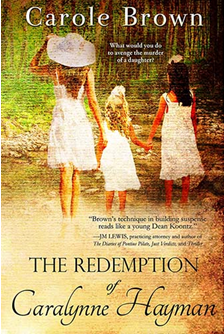 Title: The Redemption of Caralynne Hayman
Title: The Redemption of Caralynne Hayman
Author: Carole Brown
Published: October 21, 2013
Publisher: Lighthouse Publishing of the Carolinas
Word Count: 90,000
Genre: Women’s Fiction – Christian Suspense, Romance
Content Warning: Contains adult subject matter, such as abuse within cults
Recommended Age: 16+
Synopsis: How far would YOU go to avenge the murder of a daughter?
Caralynne Hayman is angry and bitter over the abuse and death of her eleven-year-old daughter from the hands of her religious group, The Children of Righteous Cain. When her husband suffers a sudden heart attack, she does nothing to help him. In her eyes someone needs to pay, and if that means all of the men in the group, then so be it.
Dayne MacFarland is sent away to college by the senior elder of the group to learn ministry. When he returns after finding salvation, determined to bring the truth to the people he’s known all his life, he rediscovers Cara and realizes the love he once felt for her is still deeply embedded within his heart.
Dayne faces men unwilling to turn their backs on the cult training he despises. Cara faces men who follow their leader in abuse toward their wives and the young girls of the group. Cara is considered rebellious and inappropriate to befriend. Dayne is the apple of Elder Simmons’ eye—until he takes a stand against their teachings.
Can Cara overcome the feelings that have governed her most of her life? Can she learn to trust Dayne, and most of all a God whom she sees as uncaring—if he’s really there at all? Only Dayne’s prayers and love can reach Cara and show her the way to redemption, and Cara must recognize and accept God’s love and forgiveness before she goes too far.
Amazon | Barnes & Noble | GoodReads
How the Redemption of Caralynne Hayman Came About
By Carole Brown
My husband and I have traveled a lot through the years. We’ve run across some interesting and unusual situations, counseled some odd cases, and ministered to some strange people. We enjoy it, and I suppose that’s why we enjoy keeping up with different current events throughout the country.
One such event caught our attention awhile back: the Texas cult. As I was looking for another plot idea (I’m a suspense writer) my husband, Dan, came up with the plot of a cult. But we needed to answer certain questions to develop the plot fully.
What was it about the cult that was unusual?
� Who would the primary character be?
� What would cause a conflict between them?
Answering those led us to these questions that needed answers.
Since we’d decided on an abusive cult, what habits/rules did they push? I wanted something that could be (supposedly) traced back to ancient Biblical days (which I didn’t go into great detail in TRofCH, but hope to in the sequel.
I wanted to show how twisted misguided people can become when they “overdose” on too much authority and power and also a mild warning against believing everything promoted to us, even when it comes under the name of church, leadership, or well-known.
�The main character, we decided, needed to be–not just a woman–but a mother who loses a daughter because of the actions of the cult. It intensified the emotions and created a problem that was at once humongous and dangerous.
I had to make Caralynne likeable, hence her great love for her two remaining daughters, her fierce loyalty to her friends, and her strength even when faced when fear from her circumstances and wicked people.
Yet to make her realistic, I also had to show her anger and bitterness: the major reasons for her lust for revenge. How can a mother lose a daughter–anyway is hard, but from abuse? It’s beyond thinking about. How much blame does a mother shoulder? Is it hard to forgive the perpetrator? Of course. Some can never get to that place. Some don’t want to. Yet I hold to the belief that for a person to have peace, there must be some kind of forgiveness. For the purposes of this book, that’s what I aimed for.
The death of a daughter would evoke emotions in a mother: anger, bitterness, and for Caralynne–a woman who has never seen real Christianity–a desire for revenge. Misguided, yes, but feelings that could easily rise up in any normal mother although most would rein in those feelings.
Once we’d brainstormed these the plot exploded.
I researched tattoos and shopped for just the right one that would symbolize what I wanted for a “cult brand.” It also had to go along with the first chapter, and be the right tattoo that would bring fear in certain situations. In this case, for a child. Ordinarily, the eye I chose wouldn’t bring fear, but for a child, seeing something fearful along with that, it was the perfect tattoo.
As I gathered more information about cults, This was vital because to bring the story alive, I needed to see how they tick. What brings people to the place where they will give their lives for a cause–in normal people‘s eyes, wrong causes? Why do people believe their leaders are correct? What kind of background could cause members to honestly think their group correct?
I needed just the right names for Appalachian people.
The setting had to hold an atmosphere of closeness and secludedness that would seem real, scary, and appropriate for the events in the book.
It was a tough book to write in many ways. I acknowledge it’s also a tough book to read to many–definitely not for the weak-hearted. I tried to show hope shining through the darkness throughout the book, and if I succeeded, if I caused readers to show more sympathy for the hurting people in the world, if I encouraged one abused soul that there is hope, then writing this book fulfilled its goal.
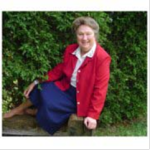 About Carole Brown: Besides being a member and active participant of many writing groups, Carole Brown enjoys mentoring beginning writers. She loves to weave suspense and tough topics into her books, along with a touch of romance and whimsy, and is always on the lookout for outstanding titles and catchy ideas. She and her husband reside in SE Ohio but have ministered and counseled nationally and internationally. Together, they enjoy their grandsons, traveling, gardening, good food, the simple life, and did she mention their grandsons?
About Carole Brown: Besides being a member and active participant of many writing groups, Carole Brown enjoys mentoring beginning writers. She loves to weave suspense and tough topics into her books, along with a touch of romance and whimsy, and is always on the lookout for outstanding titles and catchy ideas. She and her husband reside in SE Ohio but have ministered and counseled nationally and internationally. Together, they enjoy their grandsons, traveling, gardening, good food, the simple life, and did she mention their grandsons?
Amazon Author Page | Facebook | Twitter | GoodReads | Blog
Giveaway Details:
Blog Tour for The Redemption of Caralynne Hayman Giveaway. Prizes include the following:
If the winner is in the U.S., they will receive the following: Copy of The Redemption of Caralynne Hayman, Copy of West Virginia Scrapbook: From the Life of Caralynne Hayman, $15 Amazon Gift Card, Handmade Table Runner, Handmade Apron, and Hand decorated recipe box.
If the winner is INT, they will receive the following: eBook copy of The Redemption of Caralynne Hayman, eBook copy of West Virginia Scrapbook: From the Life of Caralynne Hayman, an eBook copy of Hog Insane, and a $15 Amazon Gift Card.
Click on the link below to enter the giveaway:


January 17, 2014
Book Review Friday – Two Books by Julia Gousseva
Today I review two books by the same author. Julia Gousseva stopped by Writing Whims a few days ago for Author Wednesday. I’ve been waiting to post reviews of both of her novels Moscow Dreams and Anya’s Story.
Both of these novels forced to revisit my attitudes and feelings about the Soviet Union—attitudes and feelings that were ingrained in me from a very early period by every single person in my orbit from my parents and my teachers to the political leaders I admired from afar. Recently, I saw a program on Billy Joel who spoke about his visit to the USSR.
“They were just people like me,” he said.
He was amazed as I was to put a face on a monster only to learn that monster never existed except in the minds of the people buying the propaganda spewed out to keep our enemies in view through a cheesecloth-covered lens. With this clouded view of a stereotype such as the looming mushroom cloud of the Soviet Union, no clear picture ever emerges of the individual.
No clear picture emerges that is until literature, music, art, or travel opens our eyes to the truth. Human beings the world over have more in common individually than we ever realized. Cultural traditions, languages, and governments may be different, but human emotions of love, hate, joy, and anger emerge the same.
Julia Gousseva uses the craft of prose in her novels to expose the truth beyond my childhood teachings. Moscow Dreams and Anya’s Story showed me the personal side, which left me echoing Billy Joel’s sentiment. Russian folks are people just like me.
From the moment Moscow Dreams opens, the life of a teenager in Moscow in the early 1990s reveals a life different from any I ever imagined about growing up in the Soviet Union in the twentieth century. Ms. Gousseva takes the life of Marina, in her last two years of high school, and turns it into more than just a coming of age book. The novel begins in 1991 as Boris Yeltsin makes his bid for power against the first elected Soviet president, Mikhail Gorbachev, and the turmoil felt by those living through it is confusing, painful, and powerful.
No one is more confused than Marina about the changes that occur in the next four months as the communist leader Gorbachev is routed out of his role by Yeltsin. Soon communism and party affiliations are banned and the young people in Ms. Gousseva’s novel must suddenly switch alliances to make good for their college applications. The state-owned sources of food disappear and suddenly the customs, tastes, and habits of the western world appear on the streets of Moscow. Capitalism has come to this country, and while the choices are exhilarating at first, soon the people realize their wages do not rise with the increase in food costs.
Through it all, the life of Marina and her family and friends endure the changes and still manage to find hope. It’s through Marina’s parents and her babushka that the reader learns of why change is feared and why the government is seldom to be trusted.
Anya’s Story is set in the same place and same era. To read this book is to take a step into the world of Moscow and Leningrad from several decades ago. The descriptions of Moscow and Leningrad created such a lovely picture in my mind that for the first time in my life, I feel attracted to Russia. Julia Gousseva wrote a novel in Anya’s Story that created the urge to travel to these cities and experience the magic and beauty firsthand. “Magic and “beauty” are not words I’d ever associated with this country shrouded in so much mystery and danger based on my upbringing in the United States in the 1950s and ’60s.
The characters reveal a telling picture of the universality of the individuals who lived in a country that often kept its people in a world where their livelihood and sustenance came at the whim of a sometimes disjointed and confused government. Despite never having been so dependent upon a secret government whose decision affected the lives of its people quickly and decisively, I was drawn to the characters of Ms. Gousseva’s novel. It is through the close examination of individuals that we can pull down the curtains of mystery and distrust created to win a nasty and Cold War.
I was taught the distrust and dislike, not of individuals such as the Anya of this story, but of governments that wanted to overpower the superpower status of the United States. The U.S.S.R., once an uneasy ally, became the enemy during my elementary school days. We did drills with thought in mind of an invading enemy from a Russian decorated with a fur hat and tall boots all the while swilling back vodka and wiping drool from large red noses. My neighbors and a few family members even built bomb shelters with fear of a Russian attack on the United States as the motivating factor.
Julia Gousseva has once again written a book rich in the cultures of a country with many subparts. The story floats from Moscow to Leningrad to the northern reaches of Russia to the warm state of Georgia creates a vast and expansive view of a country as varied as the one in which I live.
Through the individual stories, I learned about the very personal nature of the different faces of the Soviet Union and Russia. While in the United States, our political leaders may change every four years, we’ve never known what it was like to suddenly wake up one morning only to be told everything we ever believed and known, never really existed in the first place. Unlike books such as Orwell’s 1984 where a cold impersonal view of Communism is impressed upon the reader and where the characters never seemed quite real to me, Dreams of Moscow and Anya’s Story present very real teenagers who are different in what they want from life, but are similar in their tastes for love and excitement.
I’m very happy I found this author and her work because she managed to transport me to a very different and beautiful place through her vivid descriptions. It’s a view of Russia I enjoyed. That is perhaps the greatest thing about her novels. The gray view I’ve held of Russia all my life thanks to the Cold War of my youth, disappeared into bright and focused views of another place with people not so much different from me.


January 15, 2014
Author Wednesday – Julia Gousseva
 Welcome to Author Wednesday. Today I welcome Julia Gousseva, the author of two books set in Russia during the years when it was known as the Soviet Union or the USSR. Moscow Dreams and Anya’s Story are both historical fiction set more than twenty years ago in a land often misunderstood and shrouded in mystery to the Western world.
Welcome to Author Wednesday. Today I welcome Julia Gousseva, the author of two books set in Russia during the years when it was known as the Soviet Union or the USSR. Moscow Dreams and Anya’s Story are both historical fiction set more than twenty years ago in a land often misunderstood and shrouded in mystery to the Western world.
Welcome, Julia. It’s such a pleasure to have you visit today. I’m curious about your transition from Russia to the United States. You are Russian, born and raised in Moscow. Now, you live in Arizona. How, when, and why did you come to Arizona?
I came to Arizona in 1993. At the time, Russia was going through major political, social, and cultural changes. One of the changes was that many Western companies set up offices in Moscow and were hiring people with a good knowledge of the English language. As a recent graduate of the Moscow State Linguistic University, I felt at an advantage. Jobs were plenty, and I had my pick. For a while, I had a job that involved setting up university exchanges of scientists and researchers. One of the benefits of that job was access to catalogues of U.S. universities and discounts on graduate school exams. The choice of Arizona was simple. The postal service between Russia and the United States was incredibly slow, and I realized that I would not be able to make any of the deadlines for the various parts of the application process. The University of Arizona gave me their fax number. After that, it was pretty much a done deal. By 2001, I had a Masters’ Degree and a Ph.D from the University of Arizona as well as a full-time job teaching writing for Pima County Community College.
Both of your novels, Moscow Dreams and Anya’s Story, are set in Russia at a time of great changes. How much of these stories is biographical and how much was researched?
I lived in Moscow in 1991 and worked as a Russian-English interpreter for a British cameraman. I described all the events in Moscow Dreams from personal experience since we spent the three days of the attempted coup in 1991 walking and driving around Moscow, participating in various gatherings, and taking pictures. My best friend married a submarine officer, so a lot of Anya’s Story came from my conversations with her and my own experience living for a year in small Russian town by the Arctic circle. For both books, I researched some technical details, exact dates, etc.
Those experiences begged to be told. I’m so glad you did. Both of your protagonists, Marina in Moscow Dreams and Anya in Anya’s Story are very young, and both stories are coming-of-age stories, as well as historical fiction. Can you explain your choice of such protagonists?
I wanted to convey the idea of change, a major change. The end of high school is a time of major changes for anybody: you’re becoming an adult, finding your way in life or way into college, coming of age. And I wanted to show a parallel between changes in Marina’s and Anya’s lives and changes in the country. Both these young women are trying to adjust to their new lives as adults while the country is adjusting to its own new life as a fledgling democracy. One of the major themes in both these novels is that life is fleeting and the future is always unknown, and all we can do is make our best guesses about it and take decisions based on our understanding of the present.
That is so true, Julia. I’m very pleased you stopped by today. I look forward to you visiting again.
 About Julia: Ms. Gousseva was born and raised in Russia when it was still a part of the Soviet Union, or USSR. For a long time, Russia was hidden behind the Iron Curtain and had a mysterious image of the Evil Empire to many Westerners, specifically Americans. But Russia was a mystery not just to outsiders, but to its own people as well. One of Julia’s college history professors used to refer to Russia as a country with unpredictable past. Why? Because every time a new leader came to power, all state-issued history books were changed and rewritten. And all history books were state-issued.
About Julia: Ms. Gousseva was born and raised in Russia when it was still a part of the Soviet Union, or USSR. For a long time, Russia was hidden behind the Iron Curtain and had a mysterious image of the Evil Empire to many Westerners, specifically Americans. But Russia was a mystery not just to outsiders, but to its own people as well. One of Julia’s college history professors used to refer to Russia as a country with unpredictable past. Why? Because every time a new leader came to power, all state-issued history books were changed and rewritten. And all history books were state-issued.
Links to Julia’s Books and Social Media


January 10, 2014
Book Review Friday – Mystery, Ink – Mystery Heir
Staci Troilo and I have been following each other’s blogs for more than a year. We share a love of writing and of a place. Staci grew up in the Pittsburgh area but now lives away from the place I moved to three years ago. I appreciate her stories on her blog about her upbringing in her Italian family and the traditions of that culture within the confines of Pittsburgh. I love to read her posts about her life and her traditions. She’s written several award-winning short stories, and in 2013, she published her first novel, Mystery, Ink – Mystery Heir.
I’ve had her book on my Kindle for five months, but other books always seemed to take precedence. Finally, this past week I started reading her book Mystery Heir, which is the fifth book in the series Mystery, Ink published by Goldminds Publishing.
The book is written in the best tradition of a “cozy mystery” started and perfected by Agatha Christie.
Despite the murders and mayhem in the fictional city of Centerville in a non-named state, the writing is light and breezy. The main character, Naomi Dotson, is annoying, bold, athletic, and lovable all at once. Her sometimes more sensible–albeit fastionista–twin sister, Penelope, provides a great foil for Naomi. The two romp and trespass through the private affairs of some very prominent citizens, which makes up the recipe for a fun-filled mystery.
It’s one thing to follow the formula of a cozy mystery, it’s quite another to pull it off effortlessly so the reader forgets about the reading and only remembers the characters’ dilemmas. In stories of this type, it’s not unusual for all the characters to be rather one-dimensional, but Troilo still managed to make me care about Naomi when she finds herself in terrifying situations she brought on herself.
Troilo achieves what all writers want to achieve. Her writing is flawless, her dialogue believable, and her development of the tensions and mystery of the case Naomi tries to solve creates a story that didn’t feel as if I was reading. I became lost in the travails of the twins.
Whenever the tension becomes too taut, Troilo breaks it up with a nonsensical comment by one of the twins. While they’re holding down two murder suspects after giving them a tai kwon do move, Penelope chides Naomi for not having her phone, which means Penelope has to use hers to call the police. Silly, yet charming.
The twins could have been tragic figures since they lost their parents several years before, but they’re not. Troilo shows the young women as survivors and fighters. Naomi’s curiosity brings her into the middle of a family tree more complicated than the strings of Christmas lights I struggled to unwind a couple of weeks ago.
It’s been a few years since I’ve read a mystery. Years ago, I was hooked on Mary Higgins Clark, but then moved on to different genres. Reading Mystery Heirs made me feel as if I’d found a long-lost friend.
If you want a fast-paced read with charming and humorous characters, Mystery Heirs is a book you’re sure to love.



